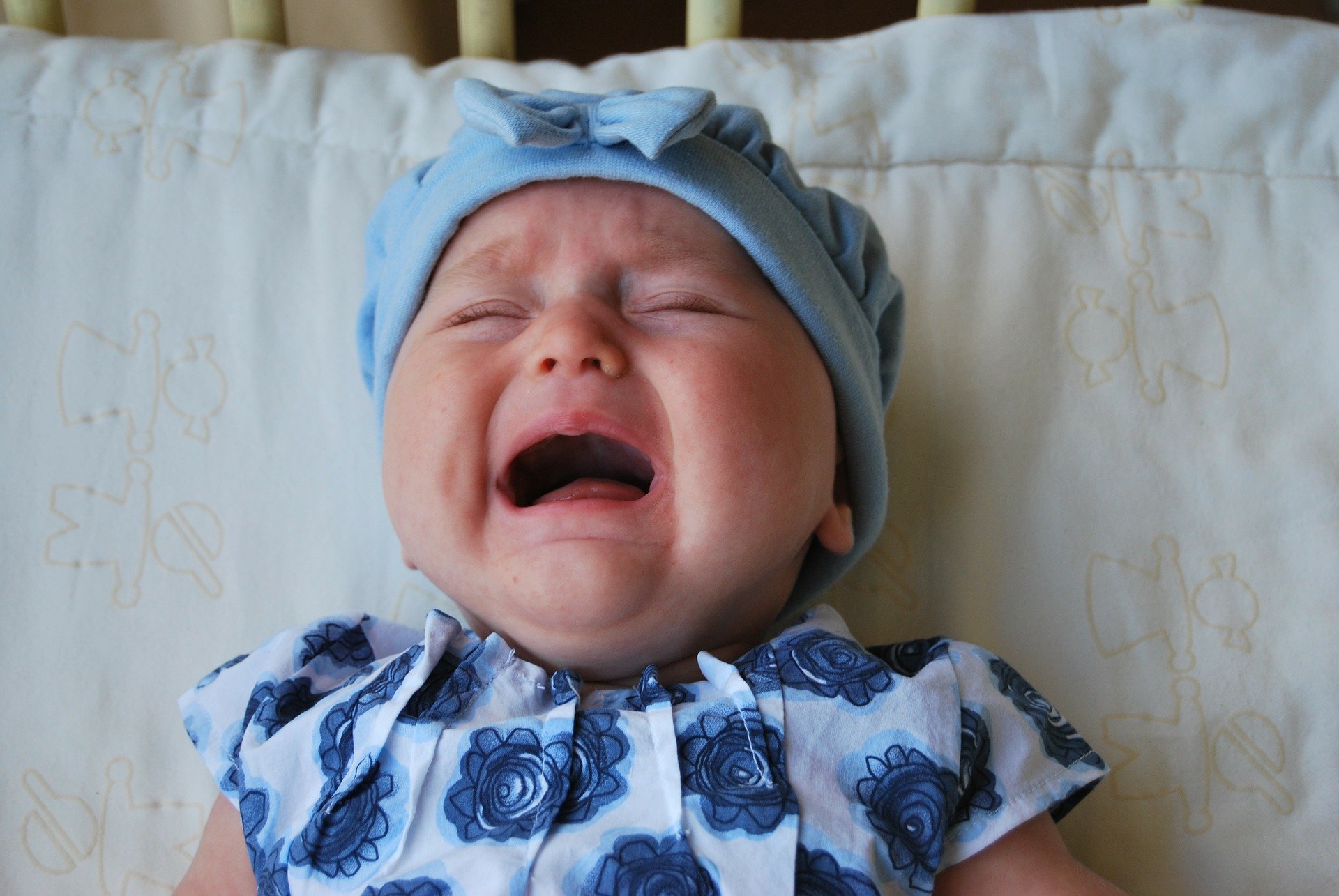
by Dr. Kristine Smith
Do you ever wonder if your baby cries more than other babies?
If so, you’re not alone. Parental concern over excessive crying is the number one reason for visits to the pediatrician in baby’s first year. I was one of those parents. When my newborn arrived, all was going beautifully for the first couple of weeks. Then out of nowhere, she began to fuss a lot. The fussing became crying, the crying became screaming and the screaming didn’t stop. After many food trials, antacid medications for suspected reflux, and wholehearted attempts at every soothing technique imaginable, our pediatrician informed us our baby was just “colicky” and we would have to ride out the storm for a few months. By ride it out I mean barely survive.
Ours was an extreme case.
When I talk to other parents about my experience, most respond that they too had worried at one point or another whether their babies were crying too much. Sometimes the fussiness occurred in just the evenings, sometimes it lasted only for a week or two. Many wondered if perhaps tummy troubles or intestinal gas were to blame. How much crying is too much, anyway? When should parents be worried? All babies are different, so how are we to know if we are being overly dramatic, or should be concerned?
Colic?
Some doctors label excessive crying as “colic”, whereas others may just call these infants excessively fussy or irritable infants. To this day most of us are confused by these terms. Dr. Morris Wessel’s original definition of colic back in the early 1950’s, was “unexplained, paroxysmal bouts of fussing and crying that last for more than three hours per day, for more than three days per week, for longer than three weeks”. However, most of today’s pediatricians consider that definition too broad and now define colic as “a paroxysmal, excessive and inconsolable crying, without identifiable cause, in an otherwise healthy infant, during the first four months of life.” Luckily, the severe crying of colic tends to resolve in 60 percent of infants by three months of age, and in almost all by four months.
Whether or not this sounds like your baby, let’s explore some of the reasons he might be crying more than usual.
- Are the basics covered? Some of the basic reasons babies cry include hunger, a wet or dirty diaper, discomfort (feeling too hot, cold, or having gas pains), needing emotional comfort, or feeling tired. If there is usually an identifiable reason why your baby is crying and the crying resolves once the need is fulfilled, there is no need to worry that your baby is too fussy.
- Can you soothe your baby when she cries? Sometimes babies seem to cry for no reason, but they are often comforted by a soothing technique such as being held, their mother or father’s voice, bouncing, white noise or music, rides in the car or walks in the stroller, a baby swing or vibrating chair. These techniques may not all work all the time, but average babies are relatively consolable, whereas colicky or extremely fussy babies have been found to be more difficult and sometimes impossible to soothe in scientific studies.
- Is it just a fussy phase? In general, most healthy babies display a fairly consistent “crying curve” that begins shortly after birth, peaks around six to eight weeks of age, and decreases to baseline at three to four months. In other words, the crying of a normal baby increases in frequency until the baby reaches six to eight weeks old, then it peters off. For whatever reason, most of the crying during this peak period takes place in the evenings around dinner time. Many mothers and pediatricians affectionately refer to this unpleasant time of day as the “witching hour.” It just happens to coincide with arriving home from work and struggling to get dinner on the table. It is not pleasant to deal with but it is manageable.
This normal crying phase is called the PURPLE crying curve.
During the Peak of the curve (6 weeks old), babies crying will be more Unexpected, Resistant (to soothing), may appear Painful, Last (a longer time), and occur mostly in the Evening. But for most babies, this behavior occurs for less than a few hours a day, for just a few weeks. If it is more frequent than that, your baby is likely on the more extreme end of the fussy spectrum. For example, in colicky infants the crying curve is hardly recognizable when they are crying much of the day for most days of the week for longer than a month.
- How intense is your baby’s cry? Multiple studies through the years have shown that when objective listeners rank tapes of different babies crying, they rank the crying of colicky babies as more intense and irritating (one study likened it to enduring nails on a chalkboard) than crying of non-colicky babies. This characteristic of intense, prolonged crying that is resistant to soothing in colicky infants has been confirmed objectively by scientists and is not simply a figment of the parents’ imagination. This is why many parents of colicky babies worry they are in pain, although no association between colic and pain has been found.
- Could something actually be wrong? If you feel like your baby may be crying more than the average baby for unknown reasons, it’s important to consult with your pediatrician to make sure there is not an underlying cause. Up to 10% of babies that cry excessively will have a medical cause such as food allergy or sensitivity, gastroesophageal reflux (acid reflux), or other potentially serious medical condition. If after consulting with your pediatrician your baby ends up in the 90% of fussy babies that don’t seem to have an underlying cause, at least you won’t need to panic every time the alarm sounds. Follow your instincts and make sure your baby is healthy.
Excessive Crier
If your baby is an excessive crier, know that studies have shown infant irritability can damage a new mother’s confidence to parent, and lead to stress and anxiety. These impacts affect how mothers interact with their baby, and can damage the mother-child bond even beyond the crying phase.
It’s important to talk to your pediatrician not only about your baby’s crying, but how it is affecting you. Similarly, confide in your family and friends. Let them know what’s going on and that you need support. Studies show moms (and dads) of fussy babies don’t need advice on how to better soothe their infants. (These infants are fussy no matter what!)
Instead, the research shows emotional support and encouragement are what make the real difference for struggling parents. Having a fussy baby is not the baby’s or the parents’ fault, but it sure can be frustrating. If you find yourself parenting an excessive crier – take plenty of time to care for yourself, get plenty of time away from your baby to recharge your batteries, and make certain to reach out and get the help and support you need. This way, once the peak of the fussiness has passed, you will be emotionally ready to enjoy your playful baby.
About the author:
Dr. Kristine Smith is a research scientist, certified health and wellness coach, speaker and author. Her research focuses on global health issues, including maternal mental health. Smith has published in peer-reviewed scientific journals on human and animal health, and is the author of The Essential Crying Baby Book: Support and Resources To Help You Cope With Colic and Calm Your Fussy Baby (a bestseller in Parenting and Child Care on Amazon), that provides emotional support to parents and information on causes, treatments, and consequences of crying in infants. For more information please visit www.essentialcryingbabybook.com.









